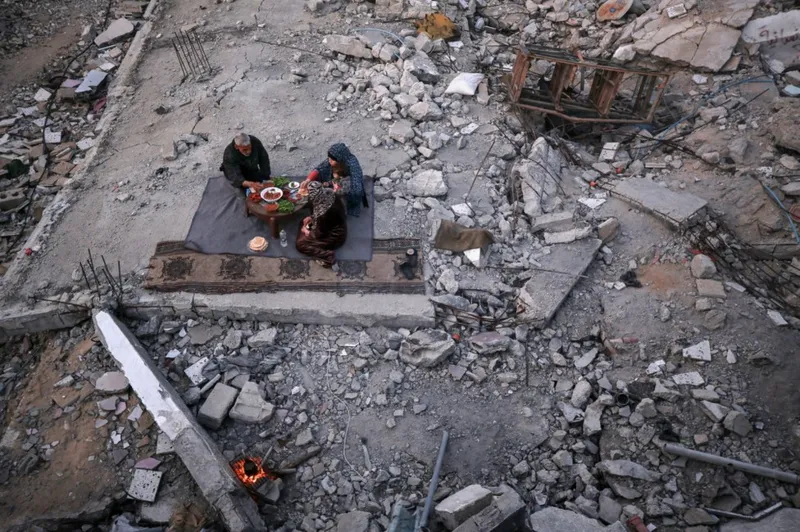When dawn broke last Monday morning, signalling the beginning of Ramadan, it brought a cruel irony for the people of Gaza.
The holy month when Muslims fast during daylight had arrived amid a looming famine.
Gazans had already endured five months of war. Virtually the entire population was already dependent on food aid to survive.
“The people here have already been fasting for months,” said Dr Amjad Eleiwa, the deputy director of the emergency department at al-Shifa hospital, Gaza City.
“They scour the city looking for food to survive, but they cannot find any.”
Israel’s bombardment of Gaza, in response to the Hamas attacks of 7 October, has destroyed food infrastructure and farmland across the territory. Aid agencies say enhanced Israeli security checks on delivery trucks have created bottlenecks around aid reaching the population.
The global body responsible for declaring famine, the Integrated Food Security Phase Classification (IPC), reported on Monday that 1.1 million people – virtually half the population of Gaza – was already starving and the rest of the people there could be in a famine by July.
The food crisis is most acute in northern Gaza. Unlike previous Ramadans, residents there cannot rely this year on lining their stomachs with suhoor, the pre-dawn breakfast, nor look forward to assuaging their hunger with iftar, the post-sunset meal.
Street decorations, drummers and stalls loaded with treats have been replaced by destruction, death and a daily fight to find food. Prices for what little flour or wheat is available have risen five-fold.
“I remember the last Ramadan, there was good food – juices, dates, milk, everything you could want,” said Nadia Abu Nahel, a 57-year-old mother caring for an extended family of 10 children in Gaza City.
“Compared to this year, it is like heaven and hell,” she said. “The children now are craving a loaf of bread, it is a meal they dream of. Their bones are becoming softer. They are dizzy, they struggle to walk. They are becoming very thin.”
According to the poverty charity Care, at least 27 people – 23 of them children – have died from malnutrition or dehydration in northern Gaza in recent weeks. The real number, according to doctors from several northern hospitals, is likely to be higher.
Among those treated for malnutrition by Dr Eleiwa at al-Shifa hospital recently was a boy aged between 10 and 12 who died last week during Ramadan; a boy aged around four months whose mother was killed, leaving him short of milk when none was available to buy; and an 18-year-old girl who was already suffering from epilepsy.
“She was already sick and none of her medicine was available any longer and her family had no food,” Dr Eleiwa said.
“In the end her body was very meagre, just bones and skin and no fat.”
Under his care at al-Shifa on Friday, 16-year-old Rafeeq Dughmoush was lying on his side, bedbound. Rafeeq’s bones were showing and one of his legs had been amputated from the knee down. A colostomy bag was attached to his torso.
Ramadan used to be a time of pure joy, Rafeef said, “heaven compared to now”.
“I am emaciated,” he said, speaking slowly in order to draw breath between words. “I am so weak I cannot move my body from one side to another. My uncle has to move me.”
Rafeeq and his sister Rafeef, 15, were severely injured when an Israeli air strike hit their home, killing 11 members of the family, their uncle Mahmoud said. Among the dead were their mother, four other siblings and their nieces and nephews.
Rafeeq was already suffering from malnutrition, he said, before the strike that wounded him. “We could not find any kind of fruit to eat, no apple, no guava, there was no meat and any food at the markets was all too expensive,” he said.
Rafeef, whose leg was shattered by the strike and pinned together, said she had asked the hospital staff for any kind of fruit or vegetable for him to eat, “but they cannot provide any”.
Ramadan used to be a time of pure joy, Rafeef said, “heaven compared to now”.
“It really was beautiful,” she said. “But these times will not come back. The best people in our lives have disappeared.”


